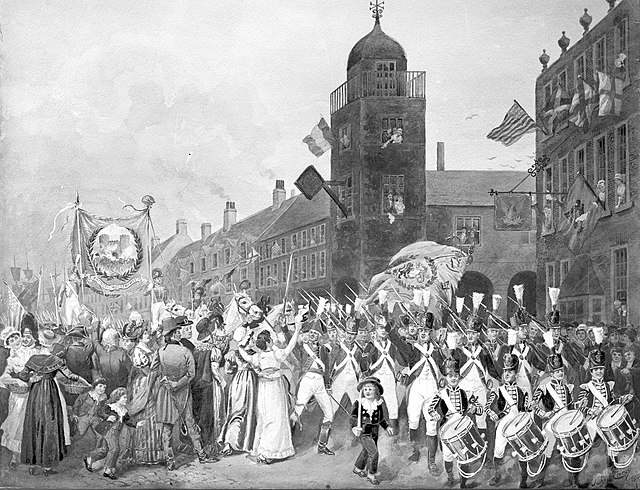Loading AI tools
1765–1838 series of revolutions in the Atlantic World From Wikipedia, the free encyclopedia
The Atlantic Revolutions (19 April 1775 – 4 December 1838) were numerous revolutions in the Atlantic World in the late 18th and early 19th century. Following the Age of Enlightenment, ideas critical of absolutist monarchies began to spread. A revolutionary wave soon occurred, with the aim of ending monarchical rule, emphasizing the ideals of the Enlightenment, and spreading liberalism.
| Atlantic Revolutions | |
|---|---|
| Part of the Age of Revolution | |
Clockwise from top:
| |
| Date | 22 March 1765 – 4 December 1838 (73 years, 8 months, 1 week and 5 days) |
| Location | |
| Caused by | |
| Resulted in | Multiple revolutions and wars across the Atlantic world, including the American Revolutionary War, French Revolutionary and Napoleonic Wars, and the Spanish American wars of independence |
Other revolutions in West Africa emphasized forms of Islam that were egalitarian in comparison to traditional forms.[1]
In 1755, early signs of governmental changes occurred with the formation of the Corsican Republic and Pontiac's War. The largest of these early revolutions was the American Revolution beginning in 1775, which founded the United States of America.[2] The American Revolution inspired other movements, including the French Revolution in 1789 and the Haitian Revolution in 1791. These revolutions were based on the equivocation of personal freedom with the right to own property — a concept spread by Edmund Burke — and on the equality of all men, an idea expressed in constitutions written as a result of these revolutions.

It took place in both the Americas and Europe, including the United States (1775–1783), Polish–Lithuanian Commonwealth (1788–1792), France and French-controlled Europe (1789–1814), Haiti (1791–1804), Ireland (1798) and Spanish America (1810–1825).[3] There were smaller upheavals in Switzerland, Russia, and Brazil. The revolutionaries in each country knew of the others and to some degree were inspired by or emulated them.[4]
Independence movements in the New World began with the American Revolution, 1775–1783, in which France, the Netherlands and Spain assisted the new United States of America as it secured independence from Britain. In the 1790s the Haitian Revolution broke out. With Spain tied down in European wars, the mainland Spanish colonies secured independence around 1820.[5]

In long-term perspective, the revolutions were mostly successful. They spread widely the ideals of liberalism, republicanism, the overthrow of aristocracies, kings and established churches. They emphasized the universal ideals of the Enlightenment, such as the equality of all men, including equal justice under law by disinterested courts as opposed to particular justice handed down at the whim of a local noble. They showed that the modern notion of revolution, of starting fresh with a radically new government, could actually work in practice. Revolutionary mentalities were born and continue to flourish to the present day.[7]
The common Atlantic theme breaks down to some extent from reading the works of Edmund Burke. Burke firstly supported the American colonists in 1774 in "On American Taxation", and took the view that their property and other rights were being infringed by the crown without their consent. In apparent contrast, Burke distinguished and deplored the process of the French revolution in Reflections on the Revolution in France (1790), as in this case property, customary and religious rights were being removed summarily by the revolutionaries and not by the crown. In both cases he was following Montesquieu's theory that the right to own property is an essential element of personal freedom.
The American Revolution, a pivotal event in the broader context of Atlantic revolutions, led to the emergence of the United States as an independent nation. Its ripple effects resonated across the Atlantic, influencing subsequent independence movements and revolutions in Europe and the Americas. For instance, the Haitian Revolution erupted in the 1790s, challenging colonial rule and inspiring aspirations for freedom and equality. Similarly, mainland Spanish colonies secured their independence around 1820 amid the turmoil of European wars. These interconnected revolutions, fueled by ideals of liberalism and republicanism, sought to overthrow entrenched aristocracies and establish governments based on the principles of the Enlightenment. The revolutionary fervor underscored the belief in the possibility of creating radically new governments founded on the principles of justice and equality, a sentiment that continues to resonate in modern times. However, the Atlantic theme of revolution faced complexities and nuances, as highlighted in the contrasting views of figures like Edmund Burke, who supported the American colonists' fight against unjust taxation but criticized the French Revolution for its perceived violation of property and religious rights.
Various connecting threads among these varied uprisings include a concern for the "Rights of Man" and freedom of the individual; an idea (often predicated on John Locke or Jean-Jacques Rousseau) of popular sovereignty; belief in a "social contract", which in turn was often codified in written constitutions; a certain complex of religious convictions often associated with deism and characterized by veneration of reason; abhorrence of feudalism and often of monarchy itself. The Atlantic Revolutions also had many shared symbols, including the name "Patriot" used by so many revolutionary groups; the slogan of "Liberty"; the liberty cap; Lady Liberty or Marianne; the tree of liberty or liberty pole, and so on.
Seamless Wikipedia browsing. On steroids.
Every time you click a link to Wikipedia, Wiktionary or Wikiquote in your browser's search results, it will show the modern Wikiwand interface.
Wikiwand extension is a five stars, simple, with minimum permission required to keep your browsing private, safe and transparent.